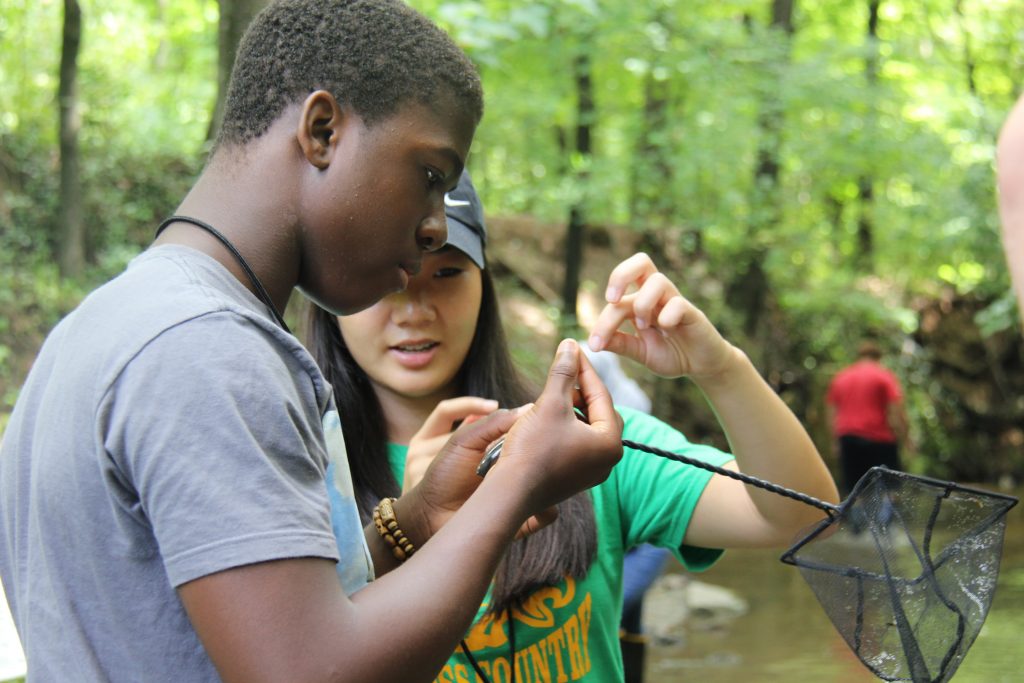Local HS students “immersed” in environmental, geosciences through IE’s yearlong IDEA Program
October 10, 2016
Over the summer, twenty-one local high school students completed a weeklong field camp immersion, through the UNC Institute for the Environment’s IDEA High School Program (IDEA), where they conducted stream sampling at local creeks, toured a wastewater treatment plant, learned about sustainable technology, met geoscientists and their students, and learned about the pathways to college and careers in the environmental and geosciences. Over the academic year, they will participate in 3 to 5 Saturday Academies. The first was held Sept. 24 at NC State’s College of Natural Resources Pathways Visitation Day.
“We start the IDEA high school experience by learning about watersheds and urban water and stormwater management issues,” said Megan Hoert Hughes, who leads IDEA.
During the summer field camp, the students conducted stream studies in local naturalized and urban streams, where they performed chemical analyses and examined biological indicators. They used the data from these sites to make comparisons with final results displayed in a research poster and presentation.
“It’s a chance for them to take what they’ve learned during the week and tell the story,” Hughes said. “Given all of the concepts they’ve learned, can they piece them together and use them to explain what is going on in this watershed?”
The students took field trips to visit a waste water treatment plant that discharges into Ellerbe Creek. They also visited the Durham County Court House to experience green infrastructure technologies in a real-world setting.
The last day of camp, students toured the dam at Falls Lake and spent the afternoon exploring the lake via canoe. Ellerbe Creek feeds into the lake, which sends water downstream into the Neuse River and eventually to the Atlantic Ocean.
“We are trying to make the connection that ‘your water is everybody’s water,’’’ Hughes said.
Throughout the year, the cohort will continue to meet for 3 to 5 Saturday Academies that focus on a variety of topics and activities such as civic engagement and public policy, planning and sustainable cities, and using GIS as a decision-making tool.
At the last Saturday Academy, students attended a variety of sessions including a GIS demonstration, which took students through the steps of using GIS models to measure the capacity of a coal ash pond, a career panel, which highlighted jobs in water quality, forest management, and environmental education, and lab tours and demonstrations at the NC State College of Natural Resources Pathways Visitation Day.
IDEA stands for “Increasing Diversity and Enhancing Academia” and is funded by the National Science Foundation. IDEA was started to promote, encourage and support underrepresented students along the pathway to careers in the geosciences. Students who participate are nominated by their schools and chosen through a selective process.
“For underrepresented minority students, the sciences may not seem like an option,” Hughes said. “Because, for most of us, if we know scientists, they are White and they are probably men. But science needs everyone. We say to the students, ‘the scientists of the world should be like the people of the world,’ because that is how we solve problems,” she added.
This year marks the fifth and final year of funding for the high school program. But IE’s Environmental Resource Program will continue to offer a version of the IDEA Program for undergraduate students.
“I hope we’ve connected them to enough of a support network that they feel like they have places to go to for more information or opportunities—that we’ve opened a network and humanized the sciences,” she said.
